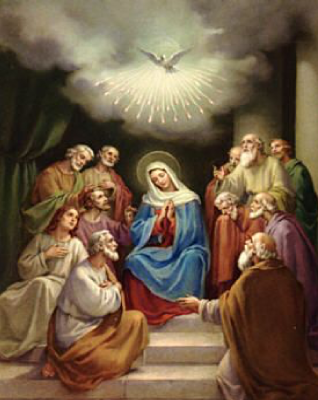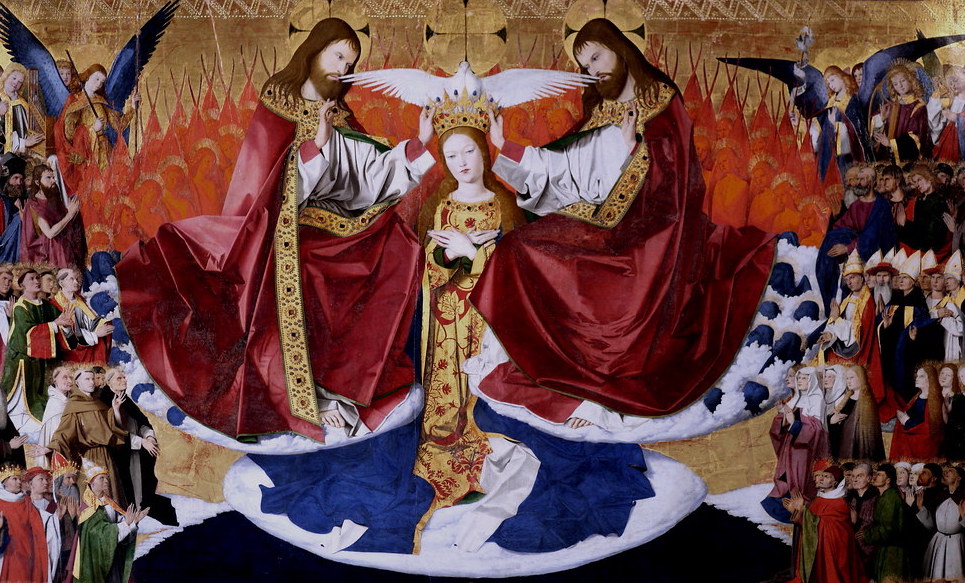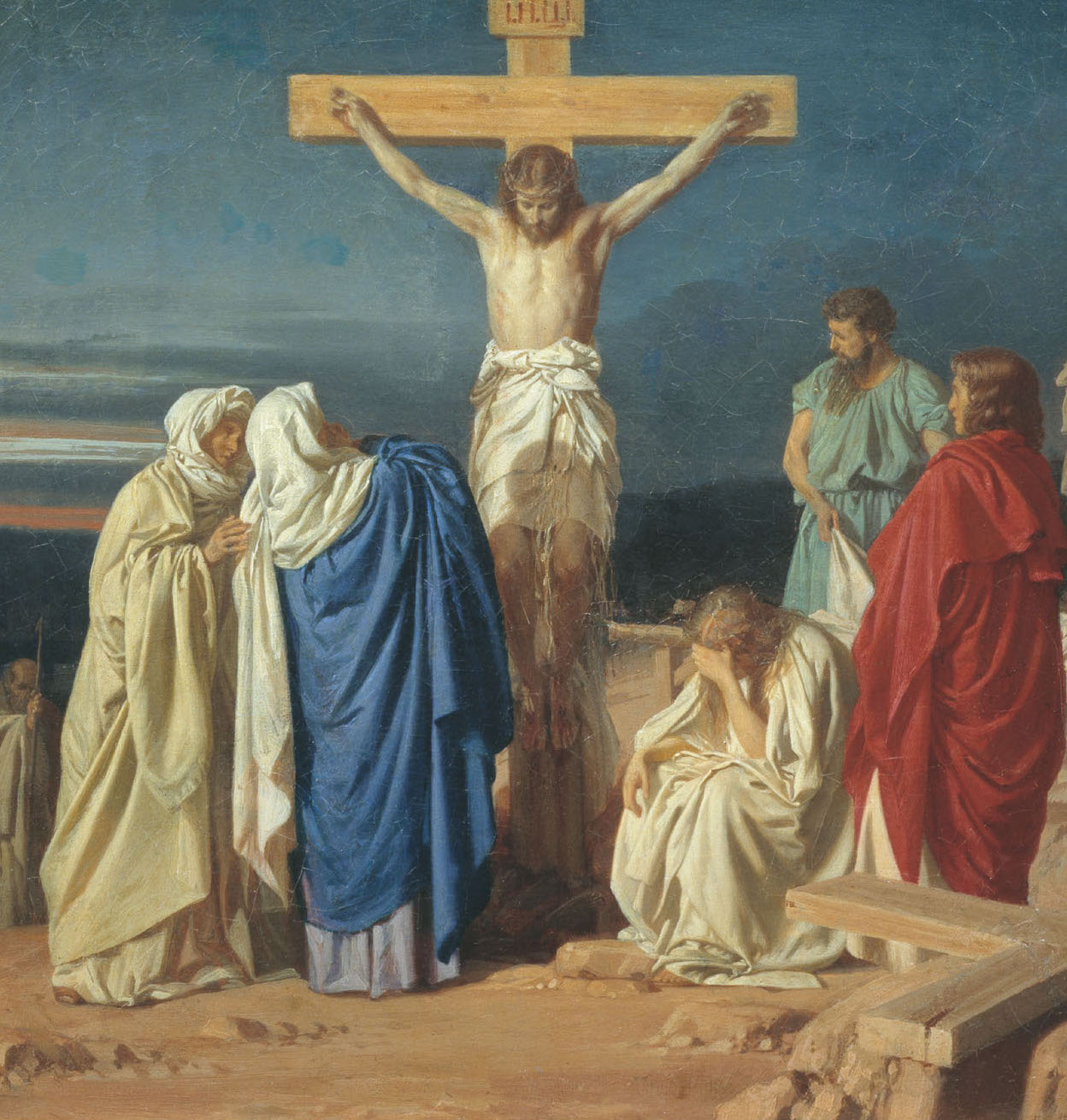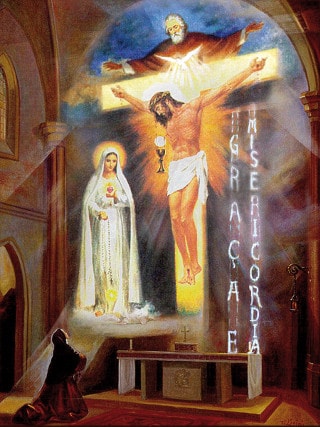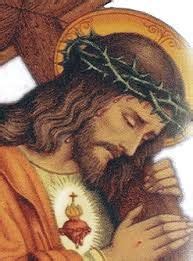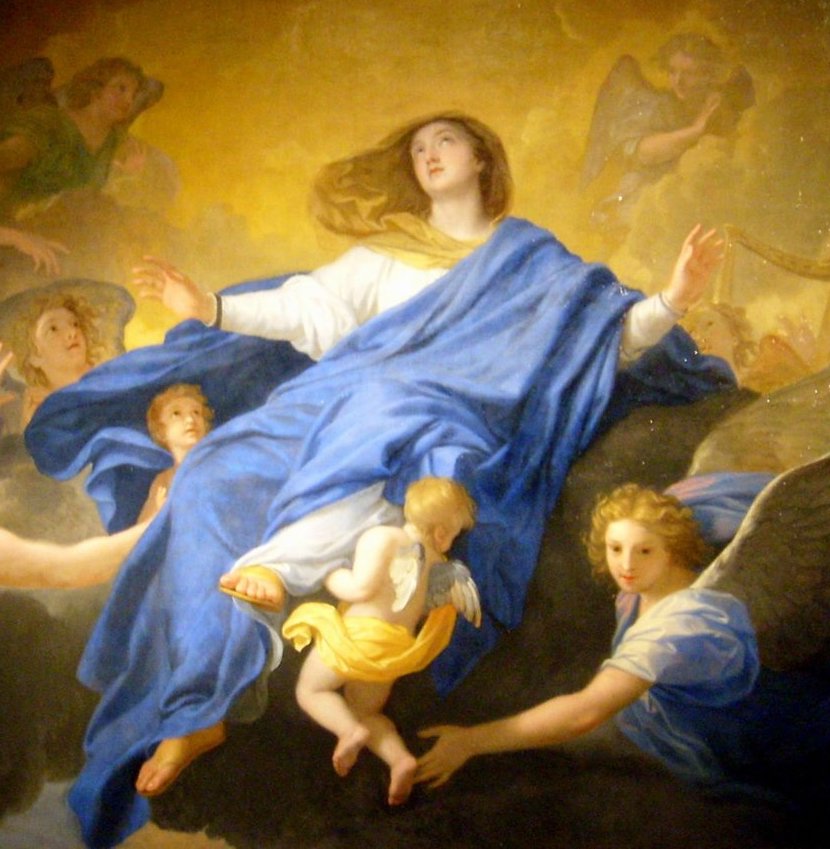On this first Saturday in June, we’re on the eve of the feast of Pentecost. We’ll keep Our Lady company for fifteen minutes, meditating on the mystery in which Our Lord, after his Ascension, sends us the Holy Spirit as he had promised.
As always, the Blessed Virgin is at the center of the key moments of our Redemption. Her humility enabled the Incarnation of the Son of God on the day of the Annunciation. In her faith on Holy Saturday, she kept the certainty of the Resurrection in her heart, and Jesus appeared to her first. Finally, through her prayers, the Holy Spirit manifested Himself at Pentecost. Let us thank our heavenly Mother and contemplate this third passage, where she is in the Upper Room with the apostles.

After Jesus’ death on the Cross, the apostles had first fallen into disarray. The Ascension was to trouble them once again. This time, their Master and Lord had left them to rejoin his Father. And once again they felt a great emptiness. Of course, they had heard Jesus’ words and his promise to send them the Holy Spirit. But what could they do without Christ? How to act? And the Blessed Virgin is there with her unshakeable faith. Stabat Mater. She waits patiently as she waited for the Resurrection. The apostles close around her. They find in Her the pillar to lean on in Jesus’ absence, and the comfort of a Mother. On that day of Pentecost, they were no doubt listening to her teaching and contemplating her peaceful trust in God. Yes, the Blessed Virgin had begun her mission as Mother of the Church. And the Holy Spirit descended from heaven.
Why was the coming of the Holy Spirit necessary after the Ascension? Why must the third person of the Holy Trinity intervene when Christ has redeemed us and is already with us in the Eucharist until the end of the world? To help us understand this mystery, let’s look at the visible appearances that the Holy Spirit has chosen to manifest Himself.
His coming is characterized first and foremost by a powerful wind, an energy that cannot be seen, but can be felt. That’s how the Holy Spirit works. It’s this divine grace, this spiritual life that penetrates us, filling our soul and heart little by little as our earthly life progresses. It is He who, through His invisible action and gifts, particularly of wisdom, counsel, intelligence and piety, helps us to progress in prayer, in the interior life, and gradually brings our soul closer to God during our earthly life. We can particularly feel His presence in these prayers and thanksgivings, where we are sometimes transported by inner joys as God deigns to discover Himself to us for a brief moment, giving us a glimpse of what paradise with Him will be like. These joys are the fruits of the wind of the Holy Spirit blowing over our souls.
After the wind come the tongues of fire. First of all, fire purifies. It is the fear of God that the Holy Spirit gives us. This Fear, often misunderstood, is not a “fear” of God. It is an acute awareness of the reality of our smallness in the face of God’s magnificence and greatness. It’s an awareness of our sinfulness in the face of God’s infinite purity. The Holy Spirit brings us this purifying humility in the face of God. Mary was full of the Holy Spirit, full of the fear of God, and therefore perfectly humble. This is one of the essential gifts of the Holy Spirit, necessary for going to God. To refuse the fear of God is to put oneself proudly on God’s level. It’s a repeat of Adam and Eve’s sin. As Saint Michael will say: “Qui ut Deus”, who is like God? Fire is also the fire of God’s love, which sets everything ablaze when we open our hearts to Him. This love of God radiates outwards, enabling us in turn to love Him and one another. This capacity for love doesn’t come from us. It’s the Holy Spirit who gives it to us. Finally, fire is the fire of faith. Faith that moves mountains and sends apostles to teach all nations.
That’s why the Holy Spirit had to come. To bring us all this, and His action completes Jesus’ work of redemption. But His action is not automatic and depends on us. The Holy Spirit does not impose Himself, and respects our freedom. For Him to act effectively in our souls, we need to be in a particular inner disposition. The world, noise, overactivity, unbridled consumerism and distractions will block the action of the Holy Spirit and leave him at the door of our soul. He won’t be able to act despite his infinite love for us. This is the parable of the sower. The Holy Spirit can do nothing on a dry path or a hard stone, but he can do everything on good soil.
Good soil is silence, recollection, detachment from the things of this world, the time we give to God every day. In his book “The Power of Silence”, Cardinal Sarah reminded us a few years ago of the vital importance of silence for any spiritual life. How much we’ve forgotten this these days. Silence is an essential component of the Mass in particular. It is the Holy Spirit who helps us to receive Christ with dignity and, after communion, helps us to pray to Him with real love in the silence of our hearts. Without silence at mass, without recollection, it will be very difficult to truly encounter Christ, despite his real presence.
There is one infallible method for understanding how to open ourselves to the action of the Holy Spirit. We must contemplate His greatest work: the Blessed Virgin Mary. She is full of grace, and therefore full of the Holy Spirit. She is the one who, throughout her life, never put the slightest brake on the action of the Holy Spirit. She is the example to follow. The apostles, who were lost after the Ascension, looked at Mary and saw her humility and faith. They drew from her example the strength to wait. And the Holy Spirit came upon them. The same is true today. It is by being united to the Blessed Virgin, by following her virtues, that we will have a sure way of increasing the presence of the Holy Spirit in our souls. Saint Louis-Marie Grignon de Montfort used to say: To Jesus through Mary. The same applies to the Holy Spirit.
Faced with today’s world situation, we are as confused as the apostles were before Pentecost. What should we do? How should we act? The answer is always in Our Lady. This is what Cardinal Burke said in 2017 on the centenary of the first apparitions at Fatima: “We are like the first disciples after Pentecost. who wonder what to do in a world that doesn’t believe. It is not without reason that the faithful feel confused, disoriented to the point of abandonment (…) At Fatima we find the means given by Our Lady to respond to this. These “Fatima means” include the rosary, 1st Saturdays and consecration. But there’s one that’s often forgotten, and that’s the fruit of the mystery of Pentecost: the offering of the difficulties of one’s duty of state for the conversion of sinners.
Indeed, we often hear talk of material charity or “humanitarianism”. It’s necessary, and Our Lord asked us to do so in the parable of the Good Samaritan. But He didn’t limit our love of neighbor to that – on the contrary. He wants us to care for our neighbor’s soul too. At La Salette, Our Lady appeared in tears, as she confided that souls were “going to hell as the leaves fall in autumn”. At Fatima, she explained: “Many souls go to hell because they have no one to sacrifice and pray for them.“Then she‘ ll show the three horrified little visionaries the eternal hell where men go who have damned themselves forever. Then she’ll entrust us all with a new mission and a new means: to save sinners by offering the hardships of our state duty. Together with the 1st Saturdays to make reparation for offenses against her Immaculate Heart, this is the other great mission Our Lady gave us at Fatima. Fatima is the world’s largest humanitarian NGO for helping others. For we work to prevent eternal suffering.
So, every day, in our little daily lives, we can all save souls in a simple way, without seeking extraordinary mortifications. Souls we don’t know, but will find again in Heaven. “One righteous soul can obtain forgiveness for a thousand criminals”, said the Sacred Heart during the apparitions at Paray-Le-Monial. Of course, this doesn’t take away from our direct apostolate with the people Providence places in our path, but it does multiply it. In this Pentecost season, may we all make the decision to integrate into our daily lives the offering of our difficulties for the conversion of sinners.
Author : Alliance 1ers Saturdays of Fatima
